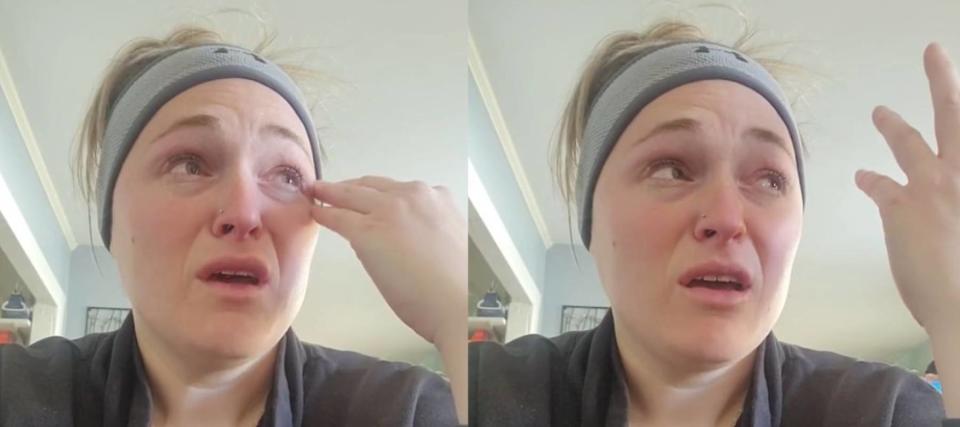It may be the most wonderful time of the year, but one Pennsylvania nurse believes that the economy is preventing her from enjoying it.
The holidays may be over, but
A woman named Mackenzie posted a viral video on TikTok of her crying about how hard it is for her and her husband to provide for themselves and their four kids. She explains what happened after she and her security-working husband — who both make “good money” — got paid on a Friday.
Don’t miss
“It is Tuesday,” she says. “We have 200 to 300 dollars to last us until next Friday.”
One commenter encouraged her to do something about her situation: “You need some Dave Ramsey!” Another told her to call into the personal finance celebrity’s radio program, The Ramsey Show, where he doles out financial advice.
So what would Ramsey tell Mackenzie?
It’s not inflation that’s hurting you
Several times throughout the video, Mackenzie expresses that she doesn’t understand how she’s struggling to barely make ends meet.
“I make good money, [my husband] makes good money, we don’t live above our means,” she says.
But Ramsey argues that the reason many people are broke is because they are living above their means, but fail to see it. So they often blame inflation instead.
“When you actually consider the way we all live, it’s outrageous,” Ramsey says. “Our lifestyles are outrageous.”
Though Mackenzie says she’s only paying for the mortgage, food and gas, Ramsey would argue that there are always items to cut out, or ways to live more frugally. For example, there are still savy ways to reduce those expenses at the checkout or pump.
Budgeting is also a great way to stay on track in these expensive times. The envelope method in particular — known as “cash stuffing” on TikTok — is a classic Ramsey method that helps with this. Here’s how it works: at the beginning of a designated period of time (say a month or a single pay cycle), you take out a set amount of cash and divide it into envelopes for each category of spending, whether that be groceries, gas or mortgage. When the envelope’s empty, you’ve run out of money for that budget item until your next cycle.
Read more: Thanks to Jeff Bezos, you can now cash in on prime real estate — without the headache of being a landlord. Here’s how
Create an emergency fund
At the end of every pay period, Mackenzie and her husband only have $200 or $300 left over. With four kids and a small ranch home, that doesn’t leave much to cover everything else, let alone an emergency expense.
Though Mackenzie doesn’t share how much she has in savings, it sounds like she’s in a situation that a staggering 70% of her fellow Americans face: living without $400 to cover an emergency expense. If you’re just one minor fender bender or emergency doctor’s visit away from going into debt, you’re too close to the edge, Ramsey would say.
This is why one of his top tips for setting yourself up for financial success is to create an emergency fund. Ramsey advises you to start with the goal of saving $1,000. Though he recommends you eventually save enough to finance three to six months’ worth of expenses, the $1,000 goal is a good place to start.
The road to $1,000 may be long, but it requires that you are committed to putting away a certain amount of money each month toward this goal. That may mean that you include “emergency fund” as one of your envelopes for the envelope method or you need to create a budget so that you can ensure that some money goes toward the emergency fund each month.
Pay off your debt
Mackenzie mentions that she attends school full-time while working full-time as a nurse. Though she doesn’t mention any kind of debt in her video, it’s likely that she carries student loans, considering 1-in-5 Americans who completed an undergraduate degree have debt, according to 2023 estimates from the Education Data Initiative.
Ramsey’s no fan of student loans or any other type of debt. He started giving out personal finance advice because he himself fell into a trap of debt. He only got out of it by using the snowball method.
The snowball approach would see you first pay off your smallest debt (or account with the lowest balance) and make only minimum payments on all of your other outstanding debts. Once you’ve paid the smallest debt off, you move on to the next smallest debt, until you’ve paid off all your debts.
Of course, if you’re dealing with multiple balances at different interest rates, you might consider the avalanche method instead. That approach will have you pay down the debt with the highest interest rate first (while still making your minimum payments on everything else), which will hopefully save you lots in interest and fees down the road.
If you’re still struggling to make do, Ramsey says you need to increase your income. These days, there are lots of side hustles that take little effort but still can make you quite a bit of cash, such as online tutoring.
Though it’s not easy to live in today’s economic climate, Ramsey has some frank advice: “There is no special sauce. You’ve got to live on less than you make, you have to invest steadily over a long period of time.”
What to read next
This article provides information only and should not be construed as advice. It is provided without warranty of any kind.
Credit: Source link




